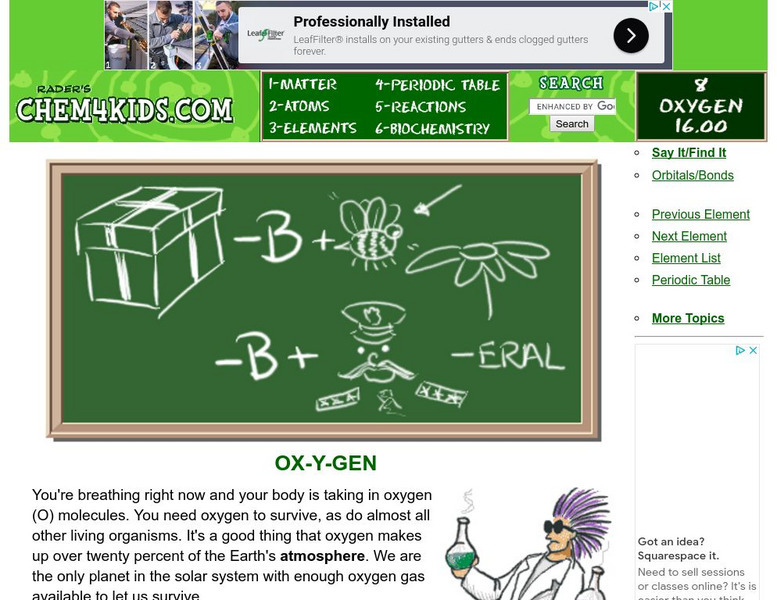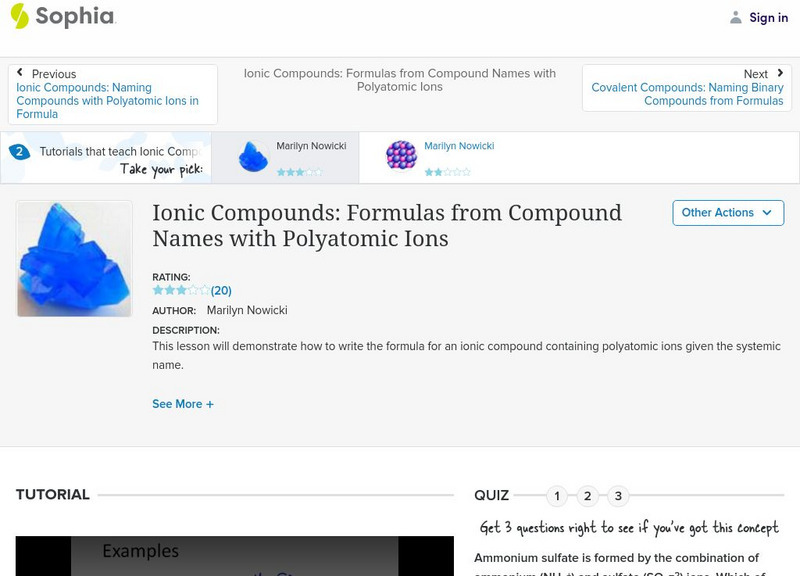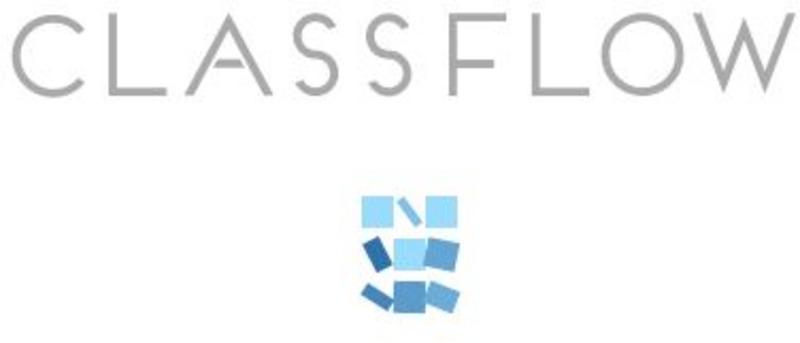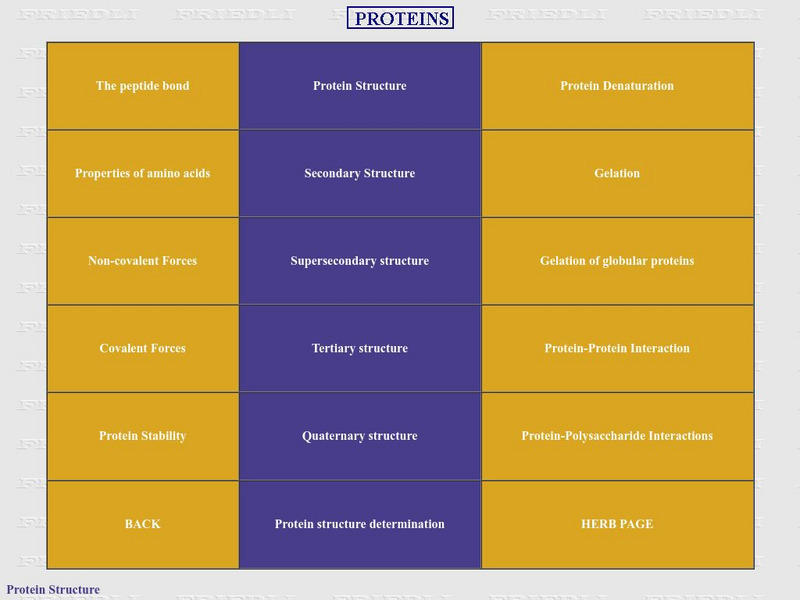Hi, what do you want to do?
BBC
Bbc: Gcse Bitesize Science: Atomic Structure
An explanation of atomic structure and the element groups in the periodic table using plain language. Supported by diagrams and charts.
American Chemical Society
Middle School Chemistry: Lesson Plans: Water Is a Polar Molecule
Students develop their own water molecule model to help them understand the idea that water has a slight positive charge at one end of the molecule and a slight negative charge at the other.
CK-12 Foundation
Ck 12: Molecular Compounds
[Free Registration/Login may be required to access all resource tools.] Students investigate compounds, and learn the ways in which molecules are named.
Concord Consortium
Concord Consortium: Nonbonding
Bring two molecules together and observe potential energy changes.
Chiral Publishing
Chiral Publishing: An Introduction to Chemistry: Molecular Structure: Power Point [Pdf]
This power point covers the molecular structure chapter from "An Introduction to Chemistry". It reviews the main ideas and shows many examples of covalent bonding from valence electrons. Also includes detailed steps to drawing lewis dot...
Biology Pages
Kimball's Biology Pages: Electronegativity
This site, which is a personal site from Kimball's Biology, provides an overview with multiple examples of electronegativity.
Concord Consortium
Concord Consortium: Molecular Workbench: Self Assembling Lattice Structure
View this simulation to see how lattice structures are formed when particles of different shapes and charges form bonds.
Educaplus (Jesús Peñas Cano)
Educaplus: Polaridad Y Diferencias De Electronegatividad [In Spanish]
Test your knowledge of Chemistry. Complete the diagram by dragging the labels to the correct location.
CK-12 Foundation
Ck 12: Flex Book Textbooks: Chemistry Second Edition
[Free Registration/Login may be required to access all resource tools.] A complete, web-based, multi-media textbook covering a wide variety of Chemistry concepts.
CK-12 Foundation
Ck 12: Organic Reactions
[Free Registration/Login may be required to access all resource tools.] Students distinguish between substitution reactions and addition reactions, and relate the concepts of oxidation and reduction to organic reactions.
Sophia Learning
Sophia: Chemistry: Electronegativity
Created to teach students of the 21st century, SOPHIA is bringing electronegativity straight to your fingertips. Become the commander of your own learning experiences as you take part in this interactive lesson and help make learning...
Sophia Learning
Sophia: Electronegativity
Explore the concept of electronegativity and how it trends across the periodic table of elements. The author uses simple, humorous drawings to help with understanding.
CK-12 Foundation
Ck 12: Chemistry for High School
This digital textbook covers core chemistry concepts and includes interactive features, real-world examples, and videos.
Other
Chem Cases: Nutra Sweet: Physical and Chemical Properties
An in-depth look at the physical and chemical properties of aspartame, or NutraSweet.
CK-12 Foundation
Ck 12: General Chemistry
[Free Registration/Login may be required to access all resource tools.] Students will be introduced to some of the basic concepts of chemistry.
Chem4kids
Chem4 Kids: Oxygen (O)
Here you can find some great information about the 8th element in the periodic table, "oxygen." Content focuses on oxygen's electrons, where you can find oxygen in nature and in the home, and how oxygen combines with other elements.
Sophia Learning
Sophia: Ionic Compounds: Formulas From Compound Names With Polyatomic Ions
This lesson will demonstrate how to write the formula for an ionic compound containing polyatomic ions given the systemic name.
Sophia Learning
Sophia: Ionic Compounds: Naming Compounds With Polyatomic Ions: Lesson 1
This lesson will provide naming rules for ionic compounds containing polyatomic ions and give examples. It is 1 of 2 in the series titled "Ionic Compounds: Naming Compounds with Polyatomic Ions in Formula."
University of Arizona
Ua: Chemistry Tutorial
This general tutorial begins with an explanation of the polarity of the water molecule and the effects this polarity has on the properties of water. Goes on to introduce organic molecules and has a thourough tutorial on the third page.
Museum of Science
The Atom's Family: Mighty Molecules
In this activity, students construct models of molecules using marshmallows and gum drops.
Royal Society of Chemistry
Kitchen Chemistry: The Structure of Ice and Water [Pdf]
A set of questions about the molecular structure of water and of ice.
Sophia Learning
Sophia: Naming Polyatomic Ions: Lesson 2
This lesson will explain that polyatomic ions have assigned names ending in -ate or -ite with a few exceptions, and discuss how ammonium is the only common polyatomic ion. It is 2 of 4 in the series titled "Naming Polyatomic Ions."
ClassFlow
Class Flow: Intro to Atoms
[Free Registration/Login Required] This flipchart was converted from Power Point and is used to introduce the history and concept of the Atom.
Other popular searches
- Ionic and Covalent Bonding
- Covalent Bonding Lab
- Covalent Bonding Activity
- Coordinate Covalent Bonding
- Ionic Covalent Bonding
- Covalent Bonding Bhopal
- Covalent Bonding Water
- Polar Covalent Bonding
- Ionic vs. Covalent Bonding
- Covalent Bonding Worksheet
- Ionic vs Covalent Bonding










![Educaplus: Polaridad Y Diferencias De Electronegatividad [In Spanish] Activity Educaplus: Polaridad Y Diferencias De Electronegatividad [In Spanish] Activity](https://content.lessonplanet.com/knovation/original/180052-bebdac3e107b5cf58c094c0fe5c0176c.jpg?1661810230)











